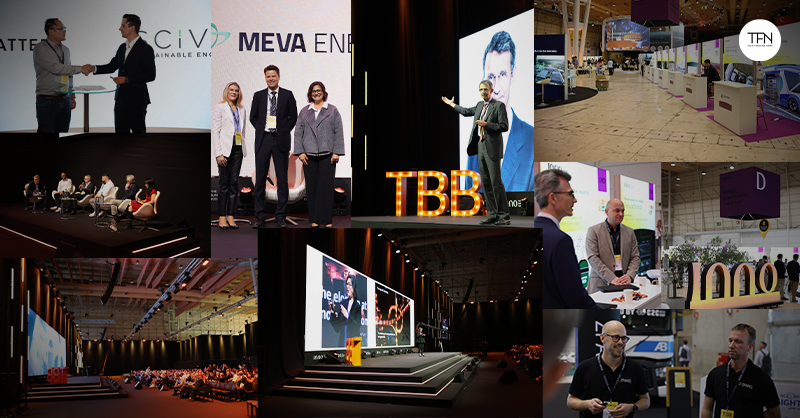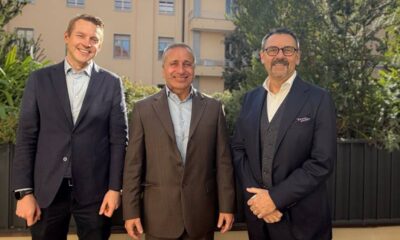Business
European Startups Showcase Ambition at The Business Booster 2025

The recent The Business Booster (TBB) held in Lisbon highlighted the ambitions of Europe’s cleantech startups, with a collective goal of mobilizing €160 billion in investments by 2030. This year’s event attracted over 1,700 participants from 52 countries, marking a significant gathering aimed at fostering innovation and collaboration in the clean energy sector. The event witnessed more than 110 innovations and facilitated over 3,500 business meetings, aimed at accelerating climate solutions across the continent.
The cleantech investment landscape in Europe faces challenges, as venture and growth capital saw a decline of nearly 18% in the first quarter of 2025, falling to €1.8 billion, with deal volumes decreasing from 182 to 153. The energy and power sector, however, remains dominant, driven by a surge in demand for AI-powered data centres, which now represent more than half of all early-stage investments.
US Market Shift Redirects Capital to Europe
As the U.S. cleantech market encounters a downturn, with weakening incentives and a reliance on grant-dependent business models, American capital is increasingly being redirected towards European opportunities. In an exclusive interview with TFN, Elena Bou, co-founder and Executive Board Member at InnoEnergy, emphasized the shift: “We saw the US market… So suddenly, what has happened? I say, hey, there is no market anymore there. So drag the brake.”
Bou noted that investors in the U.S. are now focusing on sectors like fintech, creating a window for European startups to attract investment. Even with strong interest from investors, fundraising remains a lengthy process, often taking between 12 to 18 months. Olivia Nestius, CEO of Graphmatech, confirmed this trend, stating, “The market takes a longer time now than it did a couple of years ago to close the funding round.”
Emerging Innovations in Clean Technology
The increasing demand for AI-driven data centres has emerged as a pivotal force in cleantech adoption. Bou explained, “Data centres are the new market. They’re driving energy demand and will increasingly become customers for the technologies showcased here.” This shift opens doors for European startups to offer market-ready solutions aimed at enhancing energy efficiency and optimizing grid flexibility.
For example, Sunwafe recently secured €670 million from the Spanish government to develop silicon wafers for photovoltaic panels with a capacity of up to 20 GW. Meanwhile, FertigHy, a green hydrogen and fertilizer initiative, aims to decarbonize EU agriculture with a project worth €1.3 billion, supported by InnoEnergy and Heineken.
Another noteworthy startup is Candam Technologies, based in Barcelona, which is innovating in waste management through modular recycling systems. CEO Alessandra Marsaglia highlighted their focus on improving recycling processes and engaging communities in proper waste disposal. “We develop modular solutions to improve the recycling, focusing on the collection point and on changing behaviours,” she shared.
Additionally, Energiot, another Spanish startup, is developing IoT devices for monitoring grid infrastructure. Their AI-enabled cameras aim to prevent birds from causing disruptions to power lines. Pablo Ribeiro, Partner and CBO of Energiot, explained the importance of their solution: “Birds are a huge problem for utility companies… we have an AI camera that’s able to see if birds are approaching, and then it plays a sound to scare the bird off.”
The event also showcased advancements in battery reuse, silicon energy storage, offshore wind platforms, and carbon capture technologies, reflecting the diversity of innovations present within the European cleantech sector.
Despite these advancements, the issue of gender disparity remains a significant concern. Bou noted that female founders represent only about 6% of the industry in Europe, although InnoEnergy supports a higher percentage at 11%. “We have supported 2,500 female founders and entrepreneurs… teams with female components. This is a lot,” Bou stated. Research indicates no competency gap between male and female entrepreneurs, yet systemic barriers persist, including a lack of role models and difficulties in accessing financing.
“The barriers are systemic: lack of visible role models, challenges in accessing finance beyond face-to-face networks, and structural biases,” Bou explained. She advocates for collective action to enhance visibility and support for female entrepreneurs in the cleantech space.
As InnoEnergy embarks on its new 2030 Vision, announced at TBB 2025, the organization aims to drive impact through innovation, investment, and industry collaboration. The true test lies ahead as they work towards mobilizing the ambitious €160 billion investment goal, aiming for a reduction of 2.3 gigatons of CO2 emissions, ultimately transforming not just energy generation but also the very fabric of how societies function in a sustainable future.
-

 Entertainment3 months ago
Entertainment3 months agoAnn Ming Reflects on ITV’s ‘I Fought the Law’ Drama
-

 Entertainment4 months ago
Entertainment4 months agoKate Garraway Sells £2 Million Home Amid Financial Struggles
-

 Health3 months ago
Health3 months agoKatie Price Faces New Health Concerns After Cancer Symptoms Resurface
-

 Entertainment3 weeks ago
Entertainment3 weeks agoCoronation Street Fans React as Todd Faces Heartbreaking Choice
-

 Entertainment3 months ago
Entertainment3 months agoCoronation Street’s Carl Webster Faces Trouble with New Affairs
-

 World3 days ago
World3 days agoKevin Sinfield Exceeds Fundraising Goal Ahead of Final Marathons
-

 Entertainment3 days ago
Entertainment3 days agoTwo Stars Evicted from I’m A Celebrity Just Days Before Finale
-

 World3 weeks ago
World3 weeks agoBailey Announces Heartbreaking Split from Rebecca After Reunion
-

 Entertainment3 months ago
Entertainment3 months agoWhere is Tinder Swindler Simon Leviev? Latest Updates Revealed
-

 Entertainment4 months ago
Entertainment4 months agoMarkiplier Addresses AI Controversy During Livestream Response
-

 Science2 months ago
Science2 months agoBrian Cox Addresses Claims of Alien Probe in 3I/ATLAS Discovery
-

 Health5 months ago
Health5 months agoCarol Vorderman Reflects on Health Scare and Family Support





















